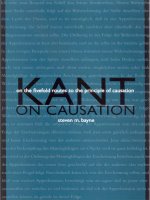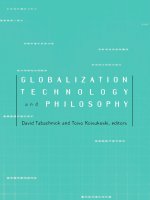state university of new york press after authority war peace and global politics in the 21st century mar 2000
Bạn đang xem bản rút gọn của tài liệu. Xem và tải ngay bản đầy đủ của tài liệu tại đây (1.73 MB, 255 trang )
AFTER AUTHORITY
SUNY series in Global Politics
James N. Rosenau, editor
AFTER AUTHORITY
❖
War, Peace, and Global Politics
in the 21st Century
Ronnie D. Lipschutz
State University of New York Press
Published by
State University of New York Press, Albany
© 2000 State University of New York
All rights reserved
Printed in the United States of America
No part of this book may be used or reproduced in any manner whatsoever
without written permission. No part of this book may be stored in a retrieval system
or transmitted in any form or by any means including electronic, electrostatic,
magnetic tape, mechanical, photocopying, recording, or otherwise
without the prior permission in writing of the publisher.
For information, address State University of New York Press
State University Plaza, Albany, N.Y. 12246
Production by Michael Haggett
Marketing by Patrick Durocher
Library of Congress Cataloging-in-Publication Data
Lipschutz, Ronnie D.
After authority : war, peace, and global politics in the 21st
century / Ronnie D. Lipschutz.
p. cm. — (SUNY series in global politics)
Includes bibliographical references and index.
ISBN 0-7914-4561-5 (hc : alk. paper). — ISBN 0-7914-4562-3 (pbk.
: alk. paper)
1. World politics—1989– 2. War. 3. Peace. I. Title.
II. Series.
D860.L55 2000
909.82'9—dc21 99-38551
CIP
10987654321
To Lee Grodzins
Contents
Acknowledgments ix
1 Theory of Global Politics 1
2 The Worries of Nations 13
3 The Insecurity Dilemma 33
4 Arms and Affluence 63
5 Markets, the State, and War 83
6 The Social Contraction 107
7 The Princ(ipal) 133
8 Politics among People 155
Notes 183
Bibliography 197
Index 221
vii
Acknowledgments
Once, it seems, we knew what to do.
—Bronislaw Szerszynski, “On Knowing What to Do”
This book has been a long time coming. It is the second in what I have
come to think of as my “security triology.” The first was On Security
(Columbia, 1995), the third is tentatively entitled Minds at Peace, and
it should appear sometime early in the next millennium. Although
some of the preliminary thinking behind this volume occurred in the
mid- to late-1980s, the ideas did not really germinate until I arrived at
UC-Santa Cruz in 1990, and taught a senior seminar entitled “National
Security and Interdependence.” Looking at the literature, I began to
think more was needed in international relations than just epistemo-
logical debate and more was needed in foreign policy than simply
“redefining security.” I tried, therefore, to write on globalization and
national security during my first few years at UCSC, but the book
refused to be written. Eventually, I gave up, and went on to other
books and other projects. Sometimes, however, books come together
quite unexpectedly, and when I returned to the project in 1997,
I discovered that a number of papers and articles I had written,
ix
x Acknowledgments
presented, and published fit together in what I thought (and what I
hope you think) is an interesting and provocative way.
As is always the case with such books, they are the product of
more than one person, although I take full responsibility for everything
that appears here. In the course of thinking about and writing what
appears here, I have incurred more debts to friends and colleagues
than I am now able to recall. Among those who have, in one way or
another, helped me along the way are Beverly Crawford, Ken Conca,
Gene Rochlin, Peter Euben, Karen Litfin, James Rosenau, Hayward
Alker (who suggested the title), Mary Ann Tetreault, and David Meyer
(and, needless to say, many more). My wife, Mary, and my children,
Eric and Maia, deserve the utmost thanks and love for showing such
great forebearance in dealing with almost constant grumpiness. Fi-
nally, I dedicate this book to Lee Grodzins who, as my graduate ad-
visor at MIT, saw that heavy-ion nuclear physics was not in my future.
Financial support for various parts of this book have come from
a variety of sources, including: the Social Sciences Division and Aca-
demic Senate of UC-Santa Cruz, the UC Systemwide Institute on Global
Conflict and Cooperation at UC-San Diego, the Center for German
and European Studies at UC-Berkeley, the Pew Charitable Trusts, and
the Lipschutz-Wieland Research Periphery.
Portions of chapter 2 originally appeared in Ronnie D. Lipschutz,
“The Great Transformation Revisited,” Brown Journal of World Af-
fairs 4, no. 1 (winter/spring 1997): 299–318. Copyright 1997 Brown
Journal of World Affairs, reprinted by permission.
Portions of chapters 3 and 4 originally appeared in Ronnie D.
Lipschutz, “On Security,” pp. 1–23, and “Negotiating the Boundaries
of Difference and Security at Millenium’s End,” pp. 212–28, in Ronnie
D. Lipschutz (ed.), On Security (New York: Columbia University Press,
1995). Copyright 1995, Columbia University Press, reprinted by per-
mission of the publisher.
A different version of chapter 5 was published as Ronnie D.
Lipschutz, “The Nature of Sovereignty and the Sovereignty of Nature:
Problematizing the Boundaries between Self, Society, State, and Sys-
tem,” in Karen T. Litfin (ed.), The Greening of Sovereignty in World
Politics (Cambridge: MIT Press, 1998). Copyright 1998 MIT Press,
reprinted by permission.
Acknowledgments
xi
Portions of chapter 6 were originally published as Ronnie
Lipschutz and Beverly Crawford, “Economic Globalization and the
‘New’ Ethnic Strife: What is to be Done?” San Diego: Institute on
Global Conflict and Cooperation, UC-San Diego, (Policy Paper 25,
May 1996). Copyright 1996 IGCC, reprinted by permission; Ronnie
D. Lipschutz, “Seeking a State of One’s Own: An Analytical Frame-
work for Assessing ‘Ethnic and Sectarian Conflicts’,” in: Beverly
Crawford and Ronnie D. Lipschutz (eds.), The Myth of “Ethnic
Conflict” (Berkeley: Institute of International and Area Studies, UC-
Berkeley, 1998). Copyright 1998 IIAS, reprinted by permission; and
Ronnie D. Lipschutz with Judith Mayer, Global Civil Society and
Global Environmental Governance (Albany: State University of New
York Press, 1996), chap. 7.
Different versions of Chapter 7 appear in Jose V. Ciprut (ed.),
“The State as Moral Authority in a Evolving Global Political Economy,”
The Art of the Feud: Reconceptualizing International Relations
(Westport, CT: Greenwood Publishing, forthcoming 2000); and David
Jacobsen, Mathias Albert and Yosef Lapid (eds.), “(B)orders and
(Dis)Orders: The Role of Moral Authority in Global Politics,” Identi-
ties, Borders and Order (Minneapolis: University of Minnesota Press,
forthcoming 2000).
Chapter 8 draws on a number of sources, including Ronnie D.
Lipschutz, “Reconstructing World Politics: The Emergence of Global
Society,” Millennium 21, no. 3 (winter 1992): 389–420 (published in re-
vised form in Jeremy Larkins and Rick Fawn, eds., International Society
after the Cold War, London, Macmillan, 1996). Copyright 1992, 1996,
Millennium Publishing Group, reprinted by permission; Ronnie D.
Lipschutz, “From Place to Planet: Local Knowledge and Global Environ-
mental Governance,” Global Governance: A Review of Multilateralism
and International Organization 3, no. 1 (January–April 1997): 83–102.
Copyright 1997, Lynne Rienner Publishers, reprinted with permission of
the publisher; Ronnie D. Lipschutz, “Members Only? Citizenship and
Civic Virtue in a Time of Globalization,” International Politics 36, no. 2
(June 1999): 203–233. Copyright 1999, Kluwer Law International, re-
printed by permission; and Ronnie D. Lipschutz, “Politics among People:
Global Civil Society Reconsidered,” in Heidi Hobbs, (ed.), Pondering
Postinternationalism (Albany: State University of New York Press, 2000).
1
1❖
THEORY OF GLOBAL POLITICS
The nation-state is in trouble. It is under siege by contradictory forces
of its own making and its leaders have no idea how to proceed. Para-
doxically, these forces are grounded in the end of the Cold War as well
as the broadly held goals of economic growth and the extension of
democracy and open markets throughout the world, the very things
that are supposed to foster peace and stability. Why should this be so?
As states open up to the world economy, they begin to lose one
of the raison d’êtres for which they first came into being: defense of
the sovereign nation. Political change and economic globalization
enhance the position of some groups and classes and erode that of
others. Liberalization and structural reform reduce the welfare role of
the state and cast citizens out on their own. As the state loses interest
in the well-being of its citizens, its citizens lose interest in the well-
being of the state. They look elsewhere for sources of identity and
focuses for their loyalty. Some build new linkages within and across
borders; others organize into groups determined to resist economic
penetration or to eliminate political competitors. The state loses con-
trol in some realms and tries to exercise greater control in others.
Military force is of little utility under such circumstances. While it
2 Chapter 1
remains the reserve currency of international relations, it is of limited
use in changing the minds of people. Instead, police power and disci-
pline, both domestic and foreign, are applied more and more. Even
these don’t really work, as any cop on the beat can attest. Order is
under siege; disorder is on the rise; authority is crumbling.
These are hardly new arguments. The search for a unifying theory
of international politics and world order has been underway for cen-
turies, if not longer. Such ideas were offered by classical and premodern
theorists of politics, such as Thucydides, Hobbes, Kant, List, and various
geopoliticians, beginning with Admiral Mahan in the final decade of
the 1800s, continuing with Halford Mackinder and Nicholas Spykman
during the middle of the twentieth century, and ending with Colin
Gray in the 1990s. After World War II, new theories were offered by
Morgenthau, Aron, Waltz, and others. Most recently, in the wake of
the Cold War’s end, these theories have been restated, albeit in a
different form, by Samuel Huntington (1996), Benjamin Barber (1995),
and Robert Kaplan (1994, 1996). So why another book on the subject
of war, peace, and global politics? One reason is that most of the
others have it wrong. That the world is changing is doubted by only
a few; how and why it is changing, and what is its trajectory, is hardly
clear to anyone.
The approach of the millennium has further enflamed the collec-
tive imagination, both popular and scholarly, adding fuel to the fire.
But most books and films—The Coming Conflict with China (Bernstein
and Munro, 1997), Independence Day and Armageddon, and the “Y2K”
furor come to mind here—offer the reader (and the policymaker) a
biblical dichotomy: the choice between order and chaos, light and
darkness, civilization and barbarity. Order draws for its inspiration on
both the recent (and antedeluvian) pasts (Noble, 1997), suggesting that
a world of well-defined nation-states, under American rule and disci-
pline, still offers the best hope for reducing the risks of war and
enhancing the possibilities for teleological human improvement. Chaos
reaches even farther back, to the authors of the Bible, as well as the
writings of Hobbes, Rousseau, and others, who warned that, in the
absence of government, there is only a “State of Nature,” the “war of
every one against every one.” The reality (and here, I wish to avoid
debates over what is “real” and what “real” means; see Kubálková,
Onuf, and Kowert, 1998) is more likely to be found somewhere in
Theory of Global Politics
3
between these two poles or even elsewhere. It is always difficult to
ascertain the trajectories of change when one stands in the midst of
that change.
In a prescient 1991 inaugural lecture at the University College of
Wales in Aberystwyth, site of the world’s first department of Interna-
tional Relations, Ken Booth put his finger on the central point. He
argued that
sovereignty is disintegrating. States are less able to perform their
traditional functions. Global factors increasingly impinge on all
decisions made by governments. Identity patterns are becoming
more complex, as people assert local loyalties but want to share
in global values and lifestyles. The traditional distinction between
“foreign” and “domestic” policy is less tenable than ever. And
there is growing awareness that we are sharing a common world
history. . . . The [metaphor for the] international system which is
now developing . . . is of an egg-box containing the shells of sov-
ereignty; but alongside it a global community omelette is cook-
ing. (Booth, 1991:542)
What Booth did not pinpoint were the reasons for the “disintegration
of sovereignty” or, for that matter, where it might lead. Indeed, al-
though virtually everyone writing on the future of world politics takes
as a starting point the decline in the sovereign prerogatives of the state,
almost no one places the responsibility for this loss directly on the
state itself. It is not that the governments of contemporary states have
meant to lose sovereignty; they were searching for means to further
enhance their power, control and sovereignty. Rather, it was that cer-
tain institutional practices set in train after World War II have, para-
doxically, reduced the sovereign autonomy that was, after all, the
ultimate objective of the Allied forces in that war.
Indeed, if there is a single central “unintended consequence” of
the international politics and economics of the past fifty years, it is the
replacement of the sovereign state by the sovereign individual as the
subject of world politics. In saying this, I do not mean to suggest that
states are bound to disappear, or that the “legitimate monopoly of
violence” will, somehow, be reassigned to tribes, clans, or individuals
(although some, such as Kaplan [1996] and Martin van Creveld [1991],
argue that, in many places, this has already happened). Instead, it is to
4 Chapter 1
argue that the project of “globalization” (an ill-defined and all-encom-
passing term, discussed in chapter 2), its commitment to individualism
in politics, markets, and civil society, and the decline in the likelihood
of large-scale wars and threats around which national mobilization can
occur, have made reification of the individual the highest value of
many societies, both developed and developing. But because global-
ization has different effects on different people, and some find them-
selves better off while others are worse off, individual sovereignty is
not accepted by all as a positive value; there is reason to question,
moreover, whether it should be regarded positively (Hirsch, 1995).
The heedless pursuit of individual self-interest can have corrosive
impacts on long-standing institutions, cultures, and hierarchies, and
can lead to a degree of social destabilization that may collapse into
uncontrolled violence and destruction.
The implications of this process for sovereignty, authority, and
security are manifold. Whereas it used to be taken for granted that the
nation-state was the object to be secured by the power of the state, the
disappearance of singular enemies has opened a fundamental ontologi-
cal hole, an insecurity dilemma, if you will. Inasmuch as different
threats or threatening scenarios promise to affect different individuals
and groups differently, there is no overarching enemy that can be used
for purposes of mass mobilization (a theme of one of Huntington’s
more recent articles; see Huntington, 1997). Those concerned about
computer hackers penetrating their cyberspace are rarely the same as
those concerned about whether they will still be welcome in their
workplaces tomorrow. Whereas it used to be taken for granted that
threats to security originated from without—from surprise attacks,
invading armies, and agents who sometimes managed to turn citizens
into traitors—globalization’s erosion of national authority has man-
aged to create movements of “patriotic” dissidence whose targets are
traitorous governments in the seats of national power.
1
The old threats were countries with bombs; the new threats are
individuals with mail privileges. The old threat was the electromag-
netic pulse from exo-atmospheric nuclear detonations; the new threat
is information warfare by rogue states, terrorist groups (and corpora-
tions?). The old threat was communist subversion by spies, sympathiz-
ers, and socialist teachers; the new threat is juvenile subversion by
pornography on the World Wide Web. The old threat was aggressive
Theory of Global Politics
5
dictators; the new threat is abusive parents. In short, loyalty to the state
has been replaced by loyalty to the self, and national authority has
been shouldered aside by self-interest. The world of the future might
not be one of 200 or 500 or even 1,000 (semi-) sovereign states co-
existing uneasily; it could well be one in which every individual is
a state of her own, a world of 10 billion statelets, living in a true State
of Nature.
What This Book Is About
This book reflects on these matters, on the “end” of authority, sover-
eignty, and national security at the conclusion of the twentieth century,
and on the implications of that end for war, peace, and individual and
global politics in the twenty-first. I am not so foolish as to argue here
that these phenomena will cease to exist in the near future or that the
state is doomed to disappear. And I have no intention of brushing over
the genealogies of these concepts or, for that matter, the state and state
system in speculating on the global political environment of the twenty-
first century. But I do propose here that, in the long view of history,
the two hundred-odd years between 1789 and 1989 were exceptional
in that the nation-state was unchallenged by any other form of political
organization at the global level.
2
That exceptional period is now just
about over.
What will emerge over the coming decades is by no means de-
termined or even clear. As the extent of social change becomes more
evident, strong states could reassert their primacy and drive the world
back into a new period of geopolitical competition (as could happen
in East Asia; see, e.g., Bernstein and Munro, 1997). It is entirely
possible that global civil society and institutions of transnational gov-
ernance will, to a significant degree, supplement or supplant national
governments, without undermining the basis for the nation (as appears
to be taking place in Europe; see Lipschutz, 1996). Or, the resulting
social tensions might be so severe as to cause a collapse into violent
chaos and nonstate forms of governance (as some suggest is occurring
in various parts of Africa and some urban agglomerations; see Jack-
son, 1990). Perhaps these, and other, forms of political community and
action will coexist, as the medieval and the modern were forced to do
6 Chapter 1
during the transition from one to the other. I make few predictions, and
no promises.
I begin, in chapter 2, with “The Worries of Nations.” One of the
much-noted paradoxes of the 1990s is the coexistence of processes of
integration and fragmentation, of globalism and particularism, of si-
multaneous centralization and decentralization often in the very same
place. James Rosenau (1990) has coined the rather unwieldy term
“fragmegration” to describe this phenomenon, which he ascribes largely
to the emergence of a “sovereignty-free” world in the midst of a “sov-
ereignty-bound” one. Rosenau frames this “bifurcation” of world poli-
tics as a series of conceptual and practical “jailbreaks,” as people
acquire the knowledge and capabilities to break out of the political and
social structures that have kept them imprisoned for some centuries.
Rosenau’s theory—if it can be called that—is an essentially liberal
one and, while he acknowledges the importance of economic factors
in the split between the two worlds, he shies away from recognizing
the central role of material and economic change and the ancillary
processes of social innovation and reorganization in this phenomenon.
Without falling into a deterministic historical materialism, it is
critical to recognize just how central “production,” as Robert Cox
(1987) and Stephen Gill (1993) put it, is to the changes to which we
are witness. Production is more than just the making of things (by
which I mean material goods as well as knowledge); it is the making
of particular things under particular forms of social organization to
fufill particular societal purposes (Latour, 1986). These purposes are
not autonomous of the material basis of a society but neither are they
superstructure to that base. The two constitute each other and, through
practice, do so on a continuous and dynamically changing basis. So-
cial organization then becomes the means by which things are pro-
duced and used to fulfill those purposes. Lest this all seem too
tautological, or functionalist, there is more at work here than just
reproduction, as we shall see. Rosenau’s “fragmegration” is, thus, a
consequence of more than just the acquisition of knowledge and skills
in a postsovereign political space; it is a direct result of the particular
ways in which production and purpose have been pursued and the
forms of social organization established to facilitate that pursuit.
The simultaneous conditions of integration and fragmentation
are, then, part of the process of social innovation and reorganization
Theory of Global Politics
7
that go hand-in-hand with changes in production and purpose. Why,
after two hundred or more years of state consolidation and centraliza-
tion, this should happen now, is not immediately apparent although the
consequences are all too clear. Whether, on balance, this is to be
regarded as a positive or negative development remains to be seen.
What is clear is that there is no teleology invoked or involved here. I
do, however, attribute recent changes to forces similar to those de-
scribed by Karl Polanyi (1944/1957) in explaining the causes of the
two World Wars, and to the ways in which knowledge and social
innovation have transformed our relationship to the nation-state and to
each other.
In chapter 3, I turn to the “Insecurity Dilemma” and its relation-
ship to globalization. What does it mean to be threatened? What does
it mean to be secure? As in the myth of the Golden Fleece, the slaying
of the Great Soviet Dragon seems to have given rise to a proliferation
of smaller, poisonous lizards, most of which are merely annoying, but
some of which might be deadly. The difficulty comes in telling the two
apart. Integration and interdependence, it has long been supposed,
foster communication, understanding, and peace, especially among
democracies, but if fragmentation is taking place at the same time, in
which direction does the arrow of safety point?
Forty years ago, John Herz (1959) pointed out how the efforts of
some states to make themselves more secure often made other states
feel less secure (see also Jervis, 1978). Inasmuch as intentions could
not be known with certainty, while capabilities could be observed with
surety, it was better to assume the worst of one’s neighbor. Today, with
the proliferation of imagined threats—imagined in the sense that vir-
tually none have, as yet, come to pass—even capabilities can no longer
be fully scrutinized. Terrorists might have acquired weapons of mass
destruction—but we do not know for sure.
3
Illegal immigrants are
subverting our cultures—but they are also supporting them. Mysteri-
ous diseases lurk in uncharted forests—but they can escape at a day’s
notice, without warning. And even the state cannot protect everyone
against these myriads of threats if it does not know whether or not they
are real (Lipschutz, 1999b).
The result is a wholesale transformation in the security appara-
tus of the state. Not only is it now directed against external enemies,
whomever and wherever they might be, but also against domestic ones—
8 Chapter 1
and these just might be the boy or girl next door. Soldiers become
cops. Cops acquire armored cars and tanks. Citizens are scrutinized
for criminal proclivities. Criminals adopt military armaments and prac-
tices. Even the paranoid have enemies and, in a paranoid society, can
anyone trust anyone except her/himself? (There may be good reason
to be paranoid, as we shall see in chapter 7; the chances are that
someone is watching you).
Historically, the purpose of “security” was to protect state and
society against war. In chapter 4, “Arms and Affluence,” I ask “What-
ever happened to World War III?” War has long been a staple topic of
film, fiction, and philosophy, if only because it is so uncommon. For
those in the midst of battle, there is hardly a big picture: One’s focus
is on survival from one moment to the next. For those who are observ-
ers, it is the infrequency and extremities of war that is so fascinating.
Yet, in virtually all discussions by international relations specialists,
war is taken not as a social institution that can, somehow, be elimi-
nated through deliberate political action, but as a “natural” outgrowth
of human nature and relations between human collectives (see, e.g.,
Waltz, 1959). Where the interests of such collectives come into conflict,
it is assumed, war will result; conversely, if collectives can negotiate
over their interests, peace is possible. Experience suggests we be more
cautious in making such unqualified claims.
Paradoxically, while the war of all against all develops apace, the
wars of state against state become ever more uncommon. The United
States prepares itself for future regional wars, such as the one under-
taken against Iraq, in the face of compelling evidence that such wars
erupt no more than once every decade or two. In place of really existing
war, we now confront virtual warfare, or what I call here “disciplinary
deterrence.” This is war by other means: by example, by punishment, by
public relations. It rests upon the United States not as world policeperson
but as dominatrix, or global vice-principal strolling down the high school
hallway, checking miscreants for hall passes. Violators, such as Iraq, get
spanked (giving new meanings to bondage and domination), and serve
as warning to others who might think about causing trouble. I return to
the implications of this metaphor in chapter 7.
Hobbes and Locke argued that Leviathan and the social contract
were necessary to counter the State of Nature, a condition in which the
sole moral stricture was to survive. Only through the state could men
Theory of Global Politics
9
(and women) begin to build societies and civilizations. In chapter 5,
“Markets, the State, and War,” I examine wars over nature, so-called
resource wars that some think could take place over scarce water. In
these cases, the limits of nature are presumed to lead to conflict and
war among those who require scarce natural goods (Lipschutz, 1989).
This amounts to a political redistribution of access meant to redress
the arbitrary boundaries of state and geography.
The solution offered to impasses of this sort is exchange in the
market, a practice and institution that, left to operate on it own under
orderly conditions, can impose peace through the price mechanism.
But markets are no less political than any other human institution; they
require rules to operate properly, and someone must formulate such
rules (Attali, 1997). Moreover, relying on markets to defuse conflicts
over resources and environment could have the perverse effect of re-
turning us to something much closer to the State of Nature through the
naturalization of market relations. Naturalizing the market removes it
from the domain of everyday politics by representing it as immutable
and subject neither to change nor to external authority. This, as I point
out, is an act of power and domination whose outcomes are quite
unlikely to be equitable or legitimate. Indeed, letting the market work
its magic may result in no more than a transitory “neoliberal” peace
that ultimately leads to vast distributive inequities and a new round of
violence (Lipschutz, 1999a).
Most contemporary wars are neither between states nor about
resources. Chapter 6, “The Social Contraction” explores the causes
and consequences of wars within nation-states, especially as mani-
fested through what we have come to call “ethnic” or “sectarian”
conflict. Conventional wisdom attributes these cultural wars to socio-
biology, ancient animosities, and the need for human beings to differ-
entiate themselves from one another. Yet, there is a fundamental problem
with such explanations: They fail to tell us in convincing fashion why
such violence did not develop earlier or why earlier periods of vio-
lence were followed by times of relative peace and stability. Even such
arguments as authoritarian governments “keeping the lid on the kettle”
are no more than inaccurate metaphors; politics is neither classical
mechanics nor thermodynamics nor even chaos theory.
Rather than being understood as some sort of atavistic or
premodern phenomenon, cultural conflict should be seen as a modern
10 Chapter 1
(or even postmodern) response to fundamental social change. The
unachievable dream of political theorists and practitioners is stability,
now and forever; the undeniable truth is change, always and every-
where. During periods of “normality,” change is slower and more
predictable; it can be managed, up to a point. Over the past few de-
cades, we have been witness to more rapid and less predictable changes,
brought about by globalization and social innovation. These changes
have destabilized the political hierarchies that rule over social orders—
even democratic ones—and provided opportunities for those who might
seek greater power and wealth to do so. The conflicts and clashes that
result can tear societies apart.
The tools for popular mobilization are both contextual and con-
tingent; the phenomenon of social warfare, as Jim Seaton (1994) calls
it, has changed only in form, but not in content. During the Cold War,
political elites mobilized polities and gained power using the discourse
of East versus West, Marxist versus Capitalist. Today, culture has
become the language under which political action takes place, and
elites operate accordingly. In all cases, it is the contractual basis of
social order that is under challenge and being destroyed. When people
find their prospects uncertain and dismal, they tend to go with those
who can promise a better, more promising future. Cultural solidarity
draws on such teleological scenarios and pie in the sky, by and by.
In Chapter 7, “The Princ(ipal),” I explore how the state—espe-
cially the American state—is engaged in both international and domes-
tic discipline in the effort to maintain political order amidst the disorder
generated by globalization. While conventional wisdom sees the nation-
state as a functional provider of security, identity, and welfare, it is better
understood as an actor that seeks to project its own, unique, national
morality into world politics. Each nation-state, as guardian of its own
civil religion and inheritor of a moral authority bequeathed to it by
Church and Prince (yes, even the United States!), is seen by its members
as the total embodiment of good. In this ethnocentric ontology, there-
fore, all other nation-states come to be representatives of evil. Those
states with power try to impose their moralities onto world politics, in
the view that the triumph of good can follow only from total domina-
tion. If this is not possible, the next best thing is obedience.
The globalization of markets, however, poses an unprecedented
challenge to statist moralities. In market society, consumption is a
Theory of Global Politics
11
good (and is good), and it is the individual’s responsibility to consume
according to his or her needs and desires. Authority thus comes to rest
within each individual, whose self-interested behavior becomes, ipso
facto, a moral good (although some might call it nihilism). The state,
seeking to reimpose order, is forced to demonstrate its authority by
acting as a moral agent able to impose its wishes both abroad and at
home. Culture wars are one result, for material girls and boys are not
so easily lured back inside the old moral borders.
Are politics in the twenty-first century destined to be so grim?
Not necessarily. Trends are never destiny. We are constrained, but we
can make choices. In chapter 8, “Politics among People,” I suggest a
more optimistic possibility. For better or worse, the end of the twen-
tieth century has seen a gradual shift of political power away from the
nation-state to the local and the global. Downward decentralization
and upward concentration could be disempowering, or they might
provide the means for global diversity and democratization. Some
governance functions are becoming globalized; others are being de-
volved to the local level. If we are not to let the global capture the
critical functions and leave the irrelevant ones to the local, it is nec-
essary to find ways to have global rules and local diversity, a
transnational politics that is both democratic and action-oriented. I
suspect that “global civil society” might be one means of accomplish-
ing this end, but there are other possibilities to offer, as we shall see.
If we leave politics to the market, we will be able to choose
among cereals, toilet paper, automobiles. If we bring politics back in,
opportunities for choices will be broader, more appealing and more
just. Political action is, therefore, an absolute necessity; if we fail to
act, we may be fat but we will not be happy. The world, “after author-
ity,” can be ours to fashion, if we so decide.









